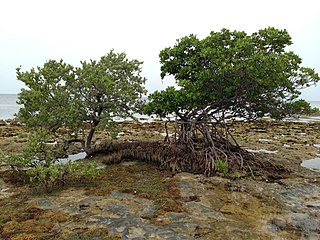Mangrove: Difference between revisions
From Indian River Lagoon Project
mNo edit summary |
mNo edit summary |
||
| Line 1: | Line 1: | ||
[[File:Left "Black Mangrove" right "Red Mangrove - panoramio.jpg|320px | [[File:Left "Black Mangrove" right "Red Mangrove - panoramio.jpg|320px | ||
|thumb|right| Black Mangrove on left and Red Mangrove on right.]] | |thumb|right| Black Mangrove on left and Red Mangrove on right.]] | ||
Three species of mangroves are found in Florida: the red mangrove, black mangrove, and white mangrove. | |||
==About Mangrove== | ==About Mangrove== | ||
[[File:Red mangrove trees at water edge.jpg|320px|thumb|right|Red mangrove trees at water edge.]] | [[File:Red mangrove trees at water edge.jpg|320px|thumb|right|Red mangrove trees at water edge.]] | ||
Revision as of 23:08, October 10, 2019

Three species of mangroves are found in Florida: the red mangrove, black mangrove, and white mangrove.
About Mangrove

Typically: red mangroves grow along the water's edge; black mangroves grow on slightly higher elevations than the red mangrove; and white mangroves grow upland from the red and black. Mangroves grow in saltwater and in areas frequently flooded by saltwater. Mangroves provide protected habitat, breeding grounds, and nursery areas to many land and marine animals. Mangroves also provide shoreline protection from wind, waves, and erosion.
